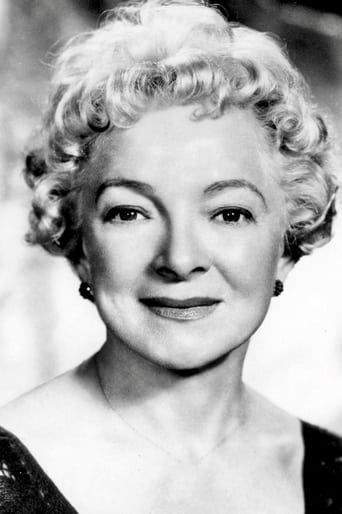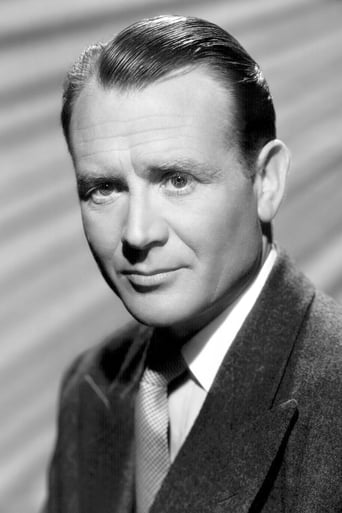Moustroll
Good movie but grossly overrated
Pacionsbo
Absolutely Fantastic
MoPoshy
Absolutely brilliant
Voxitype
Good films always raise compelling questions, whether the format is fiction or documentary fact.
essexlynford
This film is interesting for a number of reasons - not so much as a sharp pot-boiler that will keep you guessing to an enthralling climax while being stylishly stuffed full of Joan Hickson-esque quintessential old world charm - but more so because of when and how it was made, and who appears in it.The 1980's embraced the TV Movie, and the major studio players from the 30's, 40's and 50's, were still to be found appearing on screen in them, some times looking ridiculously out of place and, quite frankly, far too old and somehow exercising a diminished talent. But often still giving assured and classy performances, showing that to 'The End' (quite literally) they maintained their professional ability and standing. One can only look at Helen Hayes - The First Lady of the American Stage as she was referred to (I suppose this is why she begins quoting Shakespeare when she is seen on stage in this film) - and revel in her warm and intelligent final film appearance, and then recall poor Joan Crawford, an Oscar winning actress who thrilled and chilled in many movies, iconic in fashion and style for most of her adult life, whose final film appearance was the appalling 'Trog', where she looks old, embarrassed, and barely able to act at all. (Mind you, in fairness, she is romping about for most of it with a man in a dodgy gorilla suit grunting and moaning - the gorilla, not her.) The TV Movie could be regarded as a safe house cum retirement home for the once famous. (Channel Five daytime scheduling entertains quite a few, and you will often find an ex-Charlie's Angel or Dynasty cast member crying a lot, usually over the abduction of a child or diagnosis of an incurable disease). The plot lines and characters within a lot of these types of 'based on actual events' or biographical stories are almost echoes of some of the dramas being made on film by the big studios (particularly Warner Brothers and Universal) in the 40's and 50's. If they were shot in black and white, the short and sharp narratives, and economic style of shooting and limited camera work, could almost put them in to the B-movie Film Noir category. They are modern day (or 80's into 90's into today) versions of the pulp fiction and magazine serial type stories of times gone by.As a film fanatic, with a great love of actresses of the 30's and 40's, I cherish a movie like Murder With Mirrors. It seems crazy to have Margo Channing from All About Eve, the nurse from Farewell to Arms (the character name escapes me - I could have said one of the nannies from One of Our Dinosaurs is Missing, but great as that movie is, it is not Miss Hayes's finest celluloid moment),Miss Jones from Rising Damp along side Rumpole of the Baily, the husband from Fresh Fields and a 'teenage' Tim Roth. There's a kind of Sunday night 'bath and hair-wash and finishing off your homework' type of cosiness about this movie as well. It does lack humour, especially compared to Ustinov's Poirot, and it is not at all charming in the lavender water scented fashion that seems to go hand in hand with Hickson or even Margaret Rutherford's Marple (the contemporary setting has a lot to do with that - no one even speaks in a faux country bumpkin accent until the police constable opens his mouth!), but it zips along in a pacey soap opera kind of way, and Leo McKern is laid back and commanding while Dorothy Tutin is extreme and commanding.Bette Davis was in pain for much of the shoot (according to her book 'This 'n That') and she doesn't seem to be enjoying herself much. But the short scenes she shares with Mills and Hayes are so solid and well acted (she is so frail and laden down with make-up, it is a wonder she doesn't actually topple over forwards!) that it is a blessing to see her still working.This film is not so much about the story or the style, it is about cherishing the starry cast who all contribute as best they can and somehow, make you feel engrossed by and sympathetic to their altogether quite flimsy characters.
moonspinner55
Amateur sleuth Miss Marple visits London, is asked by an old friend to drop in on an elderly woman acquaintance whose life may be in danger. Despite Helen Hayes as Jane Marple, and Bette Davis in one of her final performances, this television-made Agatha Christie yarn is colorlessly cast, poorly written and directed, creaking and dreary the entire way through. Our introductions to the square, galumphing characters are impossibly awkward, and Hayes doesn't give her famous character the fresh spin required. Still doing what she did in 1970's "Airport" (and most likely beyond), Hayes slips around corners with 'cute' wide eyes and disagreeable looks, like a perturbed squirrel. Davis, John Mills, and Leo McKern (reunited with Hayes from 1977's "Candleshoe") try somewhat to inject a little bounce into the scenario, but it's a leadweight affair with no particularly inventive denouement.
bkoganbing
In what turned out to be Helen Hayes's farewell role, she reprises the role of Agatha Christie's famous spinster sleuth Jane Marple in Murder Is Easy. This also gives Hayes the once in a lifetime opportunity to work with another legend, Bette Davis who is the prospective victim of a poisoning plot.Helen's solicitor is worried about some strange goings on at his stepmother Bette Davis's place and is in fear for her safety. It turns out that the solicitor is the murdered party, shot while everyone else is seemingly accounted for. It's a typical Agatha Christie setup and of course there's the ever helpful Jane Marple to aid the police, in this case in the person of Leo McKern. Two more deaths occur before the mystery is solved.It's a delight to see both Hayes and Davis together and that's what the film is designed primarily to do. But frankly it's one of Agatha Christie's weakest plots. If you cannot figure out who did the crime almost immediately after the deed is done, you have not seen too many of these films. It's really rather obvious. Still for fans of Helen and Bette, it's not to be missed.
Poseidon-3
Actresses as varied as Margaret Rutherford and Angela Lansbury have played Agatha Christie's sleuth Miss Marple on the big screen. Rutherford was hugely popular at it, Lansbury less so. Joan Hickson has, thanks to a large series of TV films, become one of the most noted actresses in the role and many peoples' favorite. Here, prior to the Hickson films, is Hayes' second and last go round as the busybody with a nose for sniffing out criminal culprits. As darling as she is, she is hardly the epitome of this very British and very well-known (in the literary sense) character. She meets with a man who is expressing concern over the well-being of his step-mother, an old friend of Hayes'. So she boards a train and heads to the country estate of the family where it seems as though the step-mother (Davis) is being slowly poisoned to death. Davis' husband (Mills) has turned the estate into a sort of Home for Wayward Boys (one of whom is a young Roth.) Also on the estate is Davis' daughter Tutin and her niece Langland and nephew-in-law Laughlin. She is watched over by a stern and unfriendly caregiver (de la Tour.) Before Hayes can even delve into the poisoning issue, another member of the household is killed, shifting her focus to the discovery of the murderer. Before it's all over, her own life has been endangered a couple of times as she sniffs too close to the truth. This rather humdrum film benefits from authentic English scenery and locations, but really doesn't provide a lot in the way of entertainment. Hayes is always worth watching and is awfully cute at times (and has fun -badly- delivering a theatrical monologue as her character), but she fails to convince as a British subject and isn't given a script that's strong enough to help her form an interesting character. Mills, always a reliable actor as well, has another rather colorless role. Tutin tries to inject some drama into her somewhat silly part and McKern seems to be enjoying his blustery role of a police inspector. The bulk of the rest of the cast is portrayed by relative nobodys who would be hard pressed to pass muster on "Murder She Wrote" or "Father Dowling Mysteries". The biggest downfall of all, however, is Davis. Her character is supposed to be a sweet, caring, beloved Englishwoman who is suffering flu-like symptoms which could be poisoning. Instead, she's a brittle, severe, wraith-like, American who looks worse, upon inspection, than what Vera Miles discovered in the basement of the Bates house in "Psycho"! And people are scripted to keep telling her how great she looks! Someone as obviously ill as she really should NOT have been working, but she was determined to continue and apparently her name still drew 'em in, even in this state. The TV film drew over 20 million viewers! Difficult to the end, she was hellishly rude and obstinate with virtually everyone on the set, particularly Hayes. She has a personal makeup artist credited who was surely instructed to do her up the way she was done (with thick black false eyelashes and pencil thin brows), but it certainly was less than flattering. At this stage, she couldn't give her lines anything more than a screeching croak and had no facial expressions left. It is a sad, horrible disaster to see her wobble through this project (and she wasn't done! She filmed three more TV and feature films after this!) At least in "The Whales of August", her character was closer to her own life status than when she tried to pull off a healthy, appealing woman here. It should be noted that she and Mills were the same age even though she looks like his mother. And Hayes is only 8 years older than Davis, but looks younger. It is a shame that Hayes had to end her screen career in mediocre tripe like this, but as she said herself, at least she never had to resort to horror films or anything a family couldn't watch together.




